- Home
- Dianne Drake
The Rescue Doctor's Baby Miracle Page 3
The Rescue Doctor's Baby Miracle Read online
Page 3
And the medical supplies…The only word she could think of to describe them was meager. Her first assessment saw the basics, enough to get the job started but not enough to finish it…set-ups for IVs, first-aid supplies such as gauze and tape. One corner of the tent was piled with crates marked ‘splints and other orthopaedic equipment’, while in another corner was piled identical crates only with the label of ‘surgical’. It was such a jumble. Gideon’s people had come in, they’d pitched it up as fast they could, and gone off on the rescue. The three dozen or so casualties already brought in were being treated by people who worked methodically to get everything done. “This is it?” she asked one of the volunteers who was running through with a portable oxygen set-up.
“This is it,” said a large-boned nurse who didn’t stop to introduce herself. “Probably not the image you were hoping to capture for your camera, is it?” she called back.
“Never mind her,” a pudgy, curly-haired young man said, stepping up behind Lorna. “Gwen’s good, with a huge heart, but she’s strictly business. And I think she’s a little put out having you here.” He introduced himself as Monty Ward, one of the general volunteers. “Not medical,” he said. “I run a delivery service in Houston.”
“She’s put out by me?”
“Not you so much as your cameraman. She’s already kicked him out of the hospital tent. Said he was getting in her way.” He smiled. “Don’t take it personally. She’s a little brusque at times, but always good at what she does.”
Good at what she did but not so accepting of Lorna’s presence. Fair enough. From now on, she’d make a point of staying out of Gwen’s way, as well as Gideon’s. “How many casualties do you expect in?” Lorna asked him.
“Last mudslide they had like this killed thirty-six people and injured a couple hundred,” he called over her shoulder on his way out the door. “This one’s not as bad so far. More people got out before the worst of it so I don’t really have a clue”
Lorna shivered, thinking about treating so many people under these conditions. It was so bare, so stark. But then, in the research notes she’d read on the way down, the hospital operated on a revolving-door system. In and out as quickly as possible. Stabilize the patients, do the most necessary of emergency procedures then ship them to a real hospital so the next round of emergencies would have room. First-aid, on a little larger scale. No welcome mat, vases of flowers, or lingering.
That was basic!
Dropping her duffle onto one of the crates marked ‘orthopaedic’, Lorna pulled out a notepad then wandered up the central aisle, taking a quick look over the patients already bedded. No one seemed in distress. No one in immediate need, except the patient being set up with oxygen. Although she wasn’t there in a medical capacity, those instincts came first. So she didn’t start taking notes until her trip back down the aisle—notes for story ideas such as following one patient through from beginning to end, or concentrating on the work of one individual…such as Gideon. Which, of course, he wouldn’t permit. But it was a thought.
It was an amazing sight, watching everybody work. No questions, very little communication. People came in and out, did what was necessary, didn’t ask for direction. She did have to admit, from the little she’d seen so far, Gideon’s people responded well. They got lots of credit for that. He got credit, too, for the training, for choosing the right people. It was hard imagining Gideon in the role of administrator, not the Gideon she knew, anyway. But something told her the old Gideon and the one who existed now were miles apart.
She thought about going to find Gideon and watching him for a while, but she wasn’t ready, yet, to see him. So she simply picked up a stethoscope and set about taking vital signs. Seemed a logical thing to do. Gwen, the nurse, had more than she could handle at the moment, so why not? Blood-pressure, heart rates, pulse—all easy enough. So for the next hour, Lorna poked and prodded half the patients in her tent, as Gwen did the same with the other half. Then after that Lorna re-dressed a couple of wounds, did half a dozen neuro checks and toted water as well as a few bedpans. Patient care at the very roots. Admittedly, it felt good. In her part-time capacity as a consultant in the hospital, that’s all she did—consult. Half the time was taken up with the paperwork associated with the patient and not patient care itself. And even when her duties involved patient care it was always so indirect she could have phoned it in.
So this felt good. It had been a long time since she’d stretched her medical muscles and, surprisingly, she realized she missed it.
“Not so bad,” she said to herself, meaning the medical duty, as she elevated the leg of one patient assessed to have a bad sprain, but not a break. He didn’t understand English, naturally, but he grinned at her anyway, glad of the attention. Lorna smiled back at him. “And it looks like you’re going to be one of the lucky ones. By tomorrow you’ll be ready to go home…” If he had a home. She gave him the thumbs-up sign and started across the aisle to give the patient a drink of water and a mild pain pill when two men toting a stretcher came straight through the central area and stopped in front of her, awaiting further instruction, like she was in charge.
One quick look at the man stretched out under the sheet, even though she wasn’t really working there, told her more than she wanted to know. His leg was horribly damaged—so badly mangled her immediate reaction was to prescribe amputation in order to save his life. If she were prescribing anything medical here, which she wasn’t. “Do you have a surgeon here?” she called to Gwen, who was in a frenzy over a patient in the throes of an epileptic seizure.
“Why?” Gideon asked, rushing in with phenobarbital for Gwen’s patient.
She glanced over at him. Yes, he’d served a surgical residency, just like she’d served one in internal medicine. And for a time he’d even worked as a surgeon, fitting in his rescue callouts as permitted. She imagined he was still brilliant in surgery, the way he was then, because Gideon had never done anything that wasn’t brilliant. “Because he needs a BK amputation, stat, and I’m an internist. I don’t operate.”
“You don’t practice medicine here either,” he said roughly.
“And you’ve got enough people you can refuse my help?” She did a quick blood-pressure check of the patient with leg injury, then looked over at Gideon. “Dropping. So now tell me, what do you use as an operating theater and who do you use as a surgeon?”
He pointed to a separate area curtained off at the end of the tent and gestured for the volunteers to take the man on in. “You don’t have the temperament,” he said to Lorna, as he followed the two attendants in.
She followed him through the curtains, then helped lift the patient over onto a portable operating table. “For what? Medicine? In case you’re forgetting, I do have a medical license.”
“You talk medicine, Lorna. Not practice it.”
“I have a post at the hospital,” she defended, whilst taking yet another blood-pressure check on the man.
“Doing what?”
“Working as a hospitalist. Seeing to the continuity of care between services.” When one patient had more than one doctor, her job was to make sure the two medical practices lined up, that drugs or treatments prescribed by both didn’t conflict or overlap. In other words, she was the medical intermediary who made sure both medical services worked together. And a lot of that was…talk.
“Point made, Lorna,” he said. “You talk.” Grabbing a disposable surgical gown from an unpacked crate, he took one out for Lorna, too, and handed it over. “Now, start the IV for the anesthesia, then scrub up.”
“So now you want me?”
“Not a matter of wanting so much as—”
“Needing me?” A smile slid across her face. “Point made, Gideon. Now, show me where I can find the IV set-ups.”
Ten minutes later, the IV was inserted and Lorna was standing next to Gideon at a portable trough, scrubbing. “Any special instructions?” she asked.
“Nothing special. We try to keep everythin
g simple around here.”
“Well, simple I can handle,” she said, giving a quick sideways glace at Gideon. Dressed in hiking boots, with a green gown tied loosely over his cargo shorts and T-shirt, and a paper cap over his shaggy brown hair, he looked more the mad scientist than the brilliant surgeon. But he was brilliant. Back in the day when all else had been breaking down around them, she’d always given Gideon his due. He was an amazing physician and an outstanding surgeon, even if his boots were now muddy.
“Can you use ketamine?” he asked Lorna. “Or have you used it?”
She blinked her surprise. “You don’t have an anesthesiologist?” She was prepared to assist…hand him instruments, suction and suture the patient if that was required of her…but not administer anesthesia.
“Other than you, no. I have a veterinarian who usually does the duty because she uses anesthesia in her veterinary practice, making her more trained in it than any one else we’ve got, but she’s out in the field. We can’t wait for her to get back in. So you can do the amputation or the anesthesia, take your pick.”
A cold chill ran over Lorna as she stepped over to the patient’s bedside and looked down at him. He was young, probably not more than thirty. Unconscious from all the blood loss and barely clinging to life, all he had was the two of them to save that life. Gideon would operate, of course. No choice to be made there. But to leave her to do the rest? She shook her head skeptically. “Except for a short stint in anesthesia when I was an intern, I haven’t…” This was such an odd place to be, especially since she was in it with Gideon. In all their time together they’d never worked with each other. In fact, professionally, their medical paths had never crossed except in the cafeteria at the hospital. And now…” Look, Gideon, I’ll be honest. This scares the hell out of me.”
“You were good, Lorna. Before you…”
She knew the rest of that even though he didn’t say it. Before she’d turned her medical practice into television medicine. He’d taken it as a personal betrayal of some sort and he’d never forgiven her for that. Looking back, the day she’d told him she’d agreed to do a once-weekly medical segment on the local news had been the beginning of the end. The miscarriage had been the end. “I’m still good, Gideon. Maybe not by your standards, but by most others.”
He gave her an odd look, a frown, but one more contemplative than angry or disapproving. “I’ll talk you through,” he said. “You’ll do fine.”
Lorna nodded as she took her place at the patient’s head and awaited further instruction.
Gideon waited until she was settled, and had made sure the IV drip was adjusted accordingly and the oxygen was flowing. Then he began. “First, we won’t intubate,” he said. In other words, this was an injected anesthetic, not one administered through ventilation. “And what I need you to do is monitor his vitals and act as my surgical tech.” He pulled his mask up over his nose then put on a pair of goggles.
“This wasn’t what I had in mind when I came here,” she said, pulling up her own mask and putting on her own goggles.
“It’s never what I have in mind when I arrive,” he said, “but you do what you have to do. Around here, we work from minute to minute and try not to think ahead of the moment. It keeps you focused, keeps you on the edge, which is where you need to be to get along.” After snapping on his gloves, Gideon stepped back to appraise the wound, holding his gloved hands slightly away from the sides of his body in order not to contaminate them. “Oh, and just so you’ll know, he might moan, or even mumble,” he warned, taking two steps sideways to have a look from another angle. “Had a patient once who sang through his surgery. Ketamine can do some strange things sometimes.”
“But they don’t feel the surgery, or remember it, do they?”
“My opera singer claimed he didn’t remember a thing. But I’ve got to tell you, I still cringe every time I hear something from the Barber of Seville.” He glanced over at Lorna. “You OK?”
She nodded. “Just anxious to get this over with.”
“Then let’s do it. Get the Ketamine in him and we’ll be out of here in thirty minutes.”
“That fast?”
“It’s a simple procedure. He’ll do better once we can get him settled into a bed to rest.”
“Do you do this a lot?” she asked, as she drew up the drug and injected it into the IV port.
“Amputations…no. Field surgeries, more than I want to think about. Normally we prefer to transport our criticals to an established hospital, but sometimes we don’t have a choice. It’s do the emergency procedure out here or nothing.”
“You know I never did like surgery,” she warned.
“And I never liked internal medicine.”
She caught his quick glance at her over the top of his mask. Was he smiling? Had his eyes actually crinkled into a little smile? They’d had this debate so many times over the years…surgery versus medicine. It was always a point of rivalry between the medical services, and one in which they’d indulged a time or two. To operate, or to cure by other means. The surgeons always wanted to operate first, the internal medicine doctors always chose other means first. She’d never won the debate with Gideon. But he’d never won the debate with her. “Some things never change,” she said, feeling oddly nostalgic over something that shouldn’t have caused even the tiniest stir in her.
“Apparently.” He arched his eyebrows, and this time there was definitely a grin hiding under his mask.
As the drug seeped through the patient’s system, a somber stillness dropped down over the tiny, secluded operating theater while Gideon cleansed the wound. When he was satisfied, he picked up a scalpel and took several slashes at some leg muscle while Lorna used several pads of sterile gauze to absorb the blood oozing from the wound.
She could hear Gideon’s breathing through his mask…it was edgy, intense. That, in contrast to their patient, who was actually snoring quietly, like this was a pleasant midday nap for him. Gideon’s eyes were narrowed in concentration, too. She remembered that look, and had always teased him it would give him early wrinkles. Which it had. The one that had pressed so deeply between his dark brown eyes was permanent now, as were the ones at the corners of his eyes. Wrinkles well earned, she guessed. And, admittedly, a little bit handsome on him. They etched character into an almost too-perfect face.
“Hemostat,” he said, as he reached up to wipe the sweat from his face with his sleeve. “Two of them, actually.” Briefly, he glanced over at her. “I need to fashion the muscle so that it tucks under the skin flap and covers the bone after the leg is removed.”
She nodded. She knew the procedure, at least knew it from the textbooks. She’d just never wanted to be part of it, which was why she’d stayed away from surgery in every form. She did admire the surgeons, though, but she also had a particular weakness for what they did. And even now she could feel a bit of nausea welling up in her…nausea from the smell of the blood, and from thinking about the sound of the bone saw Gideon was about to use on the poor man.
“You doing OK?” he asked her once the procedure was under way. With his left hand Gideon gripped the protruding tibia with an instrument resembling large pliers, and with his right he lifted up his bone saw.
“Good enough.”
He chuckled. “You used to get squeamish just reading about surgical procedures.”
“You remembered that?”
“What I remember is watching you read through something particularly grisly, the way you’d turn up your nose, squint your eyes, grimace.”
“Sympathetic reaction. Sometimes I could almost feel the incision.” She shuddered. “Surgery wasn’t my strength in medicine, and I don’t deny it.” Yet here she was doing the thing she dreaded most.
“You’ll make it through,” he said, his voice almost gentle. “Just concentrate on what you’re doing and not on what I’m doing, and you’ll be fine.” As Gideon proceeded through the amputation, the patient began to moan and buck against his restraints.
“Could you hold him still?” he asked Lorna. “Just throw some body weight on him. Oh, and while you’ve got him down, take his vital signs, see how his blood-pressure is holding out. Then I’ll need more gauze, and some suture.”
“Anything else you’d like me to do in my spare time?” she muttered as she positioned herself to keep their patient from squirming while at the same time opening the IV drip.
As the saw made it through the last of the bone, Gideon glanced across the operating table at Lorna. “You’re the one who volunteered to do this.”
“When I thought you might actually have a qualified surgical team.”
“You are the qualified team, Lorna. That’s the way it is out here. You step in to volunteer and you step in all the way. You don’t get to pick and choose what you want to do. And I’m not trying to be cruel about this. Just honest.”
Pumping up the blood-pressure cuff, she shook her head. “I didn’t step in to volunteer, Gideon. I was just helping.” Then she deflated the bulb and listened for the reading.
“And you think there’s a difference? This isn’t your pretty little world of primping for the camera and telling your audience to take vitamins. This is the real medical deal out here. What doctors and nurses and medics do who don’t have to fix their hair and apply their make-up before they go to work. You step up and this is what you get.”
Lorna glared at him. “You really do have a low opinion of what I do, don’t you? Over the years, I thought that might have changed.”
“You’re a brilliant diagnostician. Always were. I never had a low opinion of that.”

 Her Secret Miracle
Her Secret Miracle New York Doc, Thailand Proposal
New York Doc, Thailand Proposal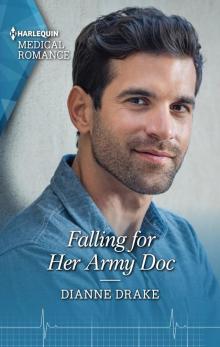 Falling for Her Army Doc
Falling for Her Army Doc Newborn Needs a Dad / His Motherless Little Twins
Newborn Needs a Dad / His Motherless Little Twins Italian Doctor, Full-Time Father
Italian Doctor, Full-Time Father The Rescue Doctor's Baby Miracle
The Rescue Doctor's Baby Miracle Second Chance with Her Army Doc
Second Chance with Her Army Doc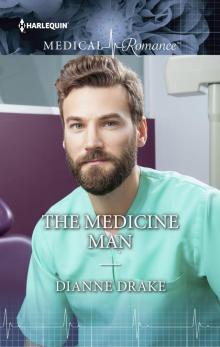 The Medicine Man
The Medicine Man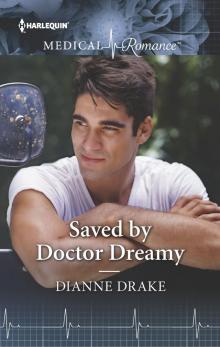 Saved by Doctor Dreamy
Saved by Doctor Dreamy His Motherless Little Twins
His Motherless Little Twins Revealing the Real Dr. Robinson
Revealing the Real Dr. Robinson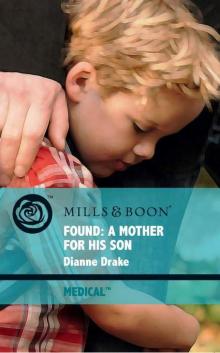 Found: A Mother for His Son
Found: A Mother for His Son The Doctor's Courageous Bride
The Doctor's Courageous Bride Emergency in Alaska
Emergency in Alaska The Baby Who Stole the Doctor's Heart
The Baby Who Stole the Doctor's Heart From Brooding Boss to Adoring Dad
From Brooding Boss to Adoring Dad Bachelor Doc, Unexpected Dad
Bachelor Doc, Unexpected Dad Doctor, Mommy...Wife?
Doctor, Mommy...Wife?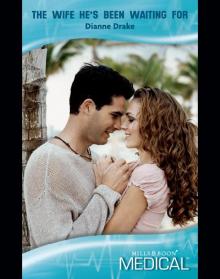 The Wife He’s Been Waiting For
The Wife He’s Been Waiting For The Nurse and the Single Dad
The Nurse and the Single Dad Christmas Miracle: A Family
Christmas Miracle: A Family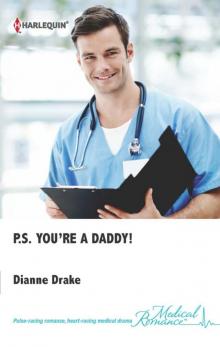 P.S. You're a Daddy!
P.S. You're a Daddy! Newborn Needs a Dad
Newborn Needs a Dad Nurse in Recovery
Nurse in Recovery Healing Her Boss's Heart
Healing Her Boss's Heart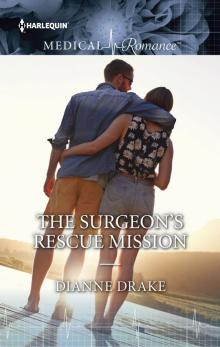 The Surgeon's Rescue Mission
The Surgeon's Rescue Mission Reunited with Her Army Doc
Reunited with Her Army Doc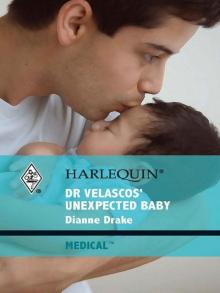 Dr Velascos' Unexpected Baby
Dr Velascos' Unexpected Baby